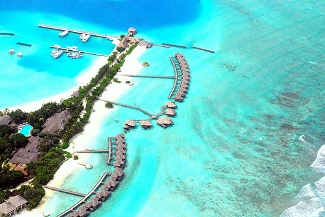 The Maldives took a step on Wednesday towards a goal of becoming the first “carbon neutral” nation by 2020 with an audit showing its citizens emit the same amount of greenhouse gases as tourists flying to its islands.
The Maldives took a step on Wednesday towards a goal of becoming the first “carbon neutral” nation by 2020 with an audit showing its citizens emit the same amount of greenhouse gases as tourists flying to its islands.
The audit, of the emissions by 310,000 citizens living in the Indian Ocean archipelago, is a prelude to a plan next year to seek investments in solar, wind or wave power and limit fuel imports that cost 15 percent of gross domestic product.
“For the Maldives, climate change is a real issue,” President Mohamed Nasheed told a webcast news conference of the goal of halting his citizens’ net greenhouse gas emissions by 2020 and so become carbon neutral.
“We are just 1.5 metres (5 ft) above sea level and therefore we are very vulnerable to any increase…in sea levels,” he said. Twenty islands were suffering erosion and 50 had problems with stemming salt water contamination of fresh water supplies.
The audit, released ahead of U.N. climate talks in Cancun, Mexico, from November 29 to December 10, estimated that Maldivians emitted 1.3 million tonnes of carbon dioxide in 2009 via electricity generation, transport, waste and fishing.
The amount was identical to the estimated amount by flights carrying 650,000 tourists to the islands every year, according to auditor BeCitizen, funded by La Compagnie Benjamin de Rothschild (CBR) and the Rothschild family.
For emissions by Maldives citizens, which will be covered by the carbon neutral plan, the total works out at 4.1 tonnes per person, compared to 23.5 tonnes per person in the United States or 5.5 in China.
Under the carbon neutral targets, any lingering greenhouse gas emissions in 2020 will be offset by measures such as the purchase of carbon credits or planting of mangroves that soak up carbon dioxide from the atmosphere.
“Achieving carbon neutrality by 2020 is possible,” said Flora Bernard, associate director of BeCitizen.
Nasheed said the Maldives did not have an estimate yet of needed investments. He added that much of the cash would be part of a development strategy — irrespective of climate change — to cut dependence on oil imports.
Only a few nations have set goals of carbon neutrality — including Costa Rica and Norway. If successful, the Maldives will be first.




